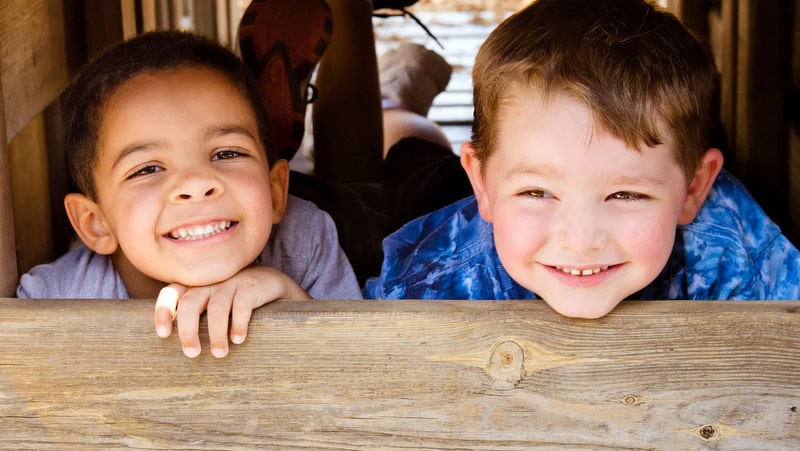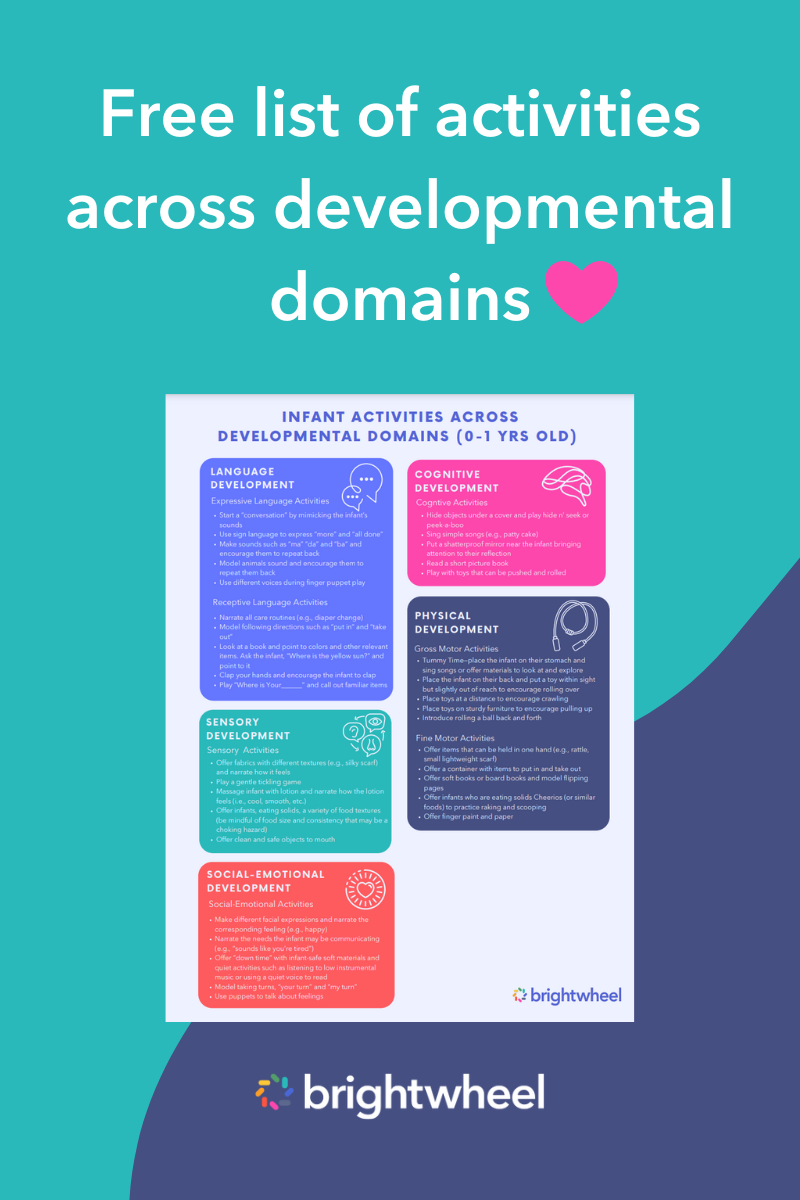
Is your little one physically, emotionally, and socially ready for the classroom? Most preschools consider an appropriate preschool age to be around three to four years old, but this isn’t a magic number for every child.
Preschool readiness depends on a lot more than age. Every child develops at their own pace, and some three year olds may be ready for preschool while other children may need some more time to gain skills to do well in the classroom.So before you enroll your child in preschool, consider these factors:
- Separation anxiety
- Social development
- Potty training
- Physical development
- Nap necessity
- Persistence
- Curiosity and imagination
- Communication skills
- Listening skills
Separation anxiety
Your child may know all their letters, shapes, and colors, but unless they’re emotionally ready for the day-to-day challenges at preschool, it may not be time to enroll them yet.
If your little one is still not comfortable being away from you, they’re not ready for preschool at age two or three. Transitioning to preschool can be a stressful event—you don’t want to add extra anxiety to the experience.
You can help relieve your little one’s stress by slowly introducing them to their new preschool routine. The National Association for the Education of Young Children (NAEYC) recommends visiting the preschool with your child before their first day to show them where their cubby is and where they will eat, play, and nap so they learn that the classroom is a safe space.
Social development
Before starting preschool, a child’s social and emotional development is shaped by their parents or caregivers. These skills help children feel confident in forming relationships, expressing how they feel, and asking for help. As their social-emotional skills develop, there are specific milestones children need to reach that will make a difference in how well they adapt to preschool. These milestones have a huge impact on how successful they can be in the classroom.
For example, if your three-year-old is still in the stage of parallel play—play that involves two or more children playing side-by-side without interacting—they may not be ready to join a classroom yet. Typically, children start to play with each other and engage in imaginative play—both key components of preschool programs—around age three.
A child’s ability to play with others is the foundation for tons of other social-emotional skills they’ll gain during preschool. It guides them through things like taking turns and sharing toys. Playtime and interacting with other children in a classroom setting can help them practice important social skills like waiting their turn and saying “please” and “thank you.”
As your three- or four-year-old gets ready to start preschool, they need to be socially aware of how to treat other children and be emotionally prepared to interact with them.
Potty training
Sometimes preschools will help with potty training, but many require that this skill is mastered before enrolling. Nevertheless, potty training is such a developmental milestone that it can strongly indicate preschool readiness.
Physical development
How is your child developing physically? Do they have the physical development skills to handle classroom materials or playground equipment? By age three, toddlers typically know how to walk and maintain their balance, string items together, coordinate their hands for play, and use a fork. The development of these fine and gross motor skills prepares them for the physical development milestones they’ll hopefully learn and master during preschool, such as holding a pencil or crayon as they learn to write letters and draw shapes. They’ll also be able to master walking up and down stairs and even putting on some clothes—like pants or a jacket—by themselves.
Your child will fine-tune these skills in preschool and should have the motor control to keep up with their classmates to be successful at preschool.
Nap necessity
If your three-year-old still needs a two-hour nap each afternoon, they may not be developmentally ready for the activity level at preschool.
Usually, preschools have naps built into the day, but your child may not sleep as well at school as at home, which can lead to crankiness or an adjusted sleeping schedule.
Persistence
Does your three-year-old get easily frustrated when learning new skills? Do they struggle with motivation? They may not have the persistence necessary to succeed in preschool.
Your child needs to be willing to work through their frustration and try challenging tasks to do well academically and socially in preschool. If your child struggles to stay motivated when facing challenges, it may be best to wait to enroll them in preschool.
Curiosity and imagination
Is your child curious about the world around them? Do they ask open-ended questions and come up with imaginative solutions to problems? Curiosity is a necessary skill that preschoolers need as they learn, explore, and interact with other children.
However, if your child hasn’t begun to ask open-ended questions about other people or the world around them, they may not be ready for the academic and social environment of preschool.
Communication skills
How well can your child communicate? According to the Centers for Disease Control and Prevention (CDC), the language and communication milestones children should have by age three include using at least two back-and-forth exchanges in a conversation, asking “who,” “what,” “where,” or “why” questions, saying their first name when asked, and talking well enough for others to understand, at least most of the time.
The communication skills and language development they have acquired before starting preschool directly affect their literacy (the ability to read and write) and speaking ability during preschool and beyond. When children can effectively communicate, this helps them build relationships with their peers and a strong foundation for reading and writing.
Listening skills
Listening skills can be challenging to evaluate, but a child’s listening skills are closely tied to comprehension. By age three, listening skill milestones for your child might look like understanding basic nouns and pronouns.
For example, consider the following sentence: “Julie has an orange toy. Orange is her favorite color.” A child with developed listening skills and comprehension is able to deduce that Julie’s favorite color is orange by connecting the pronoun “her” to “Julie.” They are able to understand “mine” versus “yours,” plural words, and most simple sentences. Similar to social and communication milestones, listening skills can help preschoolers develop their literacy skills as they learn to read, write, and express themselves.
What if my child isn’t ready for preschool?
You want preschool to be a positive experience for everyone. If your three- or four-year-old isn’t ready, there’s no harm in waiting until they’re older to enroll them in preschool. Preschool programs usually accept children up to four years old.
If you think they’re just on the cusp of being ready, consider enrolling them in a part-time program. Make sure the program is at least three days a week so that they develop a sense of the routine and schedule that school adds to their life.
Benefits of preschool
Preschool creates the opportunity for children to experience a rich and engaging learning environment and be exposed to new things as they develop key skills. In the early years from birth to age five, children learn essential social-emotional, physical, language, and cognitive skills that will prepare them for success in future schooling and life.
By sending your child to preschool, you give them the opportunity to experience improved academic performance, better socialization and communication, and increased physical activity. The benefits become more apparent once you consider preschool learning objectives and the skills preschoolers learn.
Preschool skills include:
- Critical thinking skills (making predictions, learning cause-and-effect)
- Problem-solving skills (resolving conflicts, asking for help, showing persistence)
- Early literacy skills (tracing letters, recognizing letter sounds and simple rhymes)
- Early math skills (recognizing numbers, identifying patterns, reciting numbers from one to 10)
- Personal care and hygiene (washing hands, brushing teeth, getting dressed)
Bottom line
Preschool is an important developmental period for young children. While the average preschool age is three to four years old, as a parent, you ultimately decide when your little one is ready for preschool. There are several developmental milestones to look at: Is your child interacting with other children? Are they curious about the world around them? Can they practice active listening?
Children develop at different times, and there’s no harm in waiting until they’re ready. When they are, they can start experiencing the many benefits that come with early childhood education.

